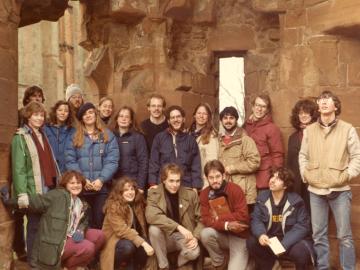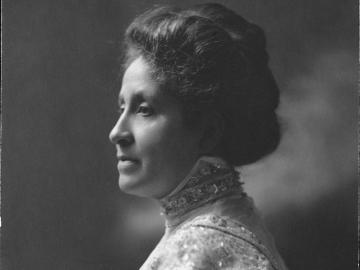Oberlin Alumni Magazine
How to Succeed in Business
July 16, 2024
Annie Zaleski

Two decades ago, Stewart Kohl ’77 and Béla Szigethy ’77 put together a Winter Term course that introduced Oberlin students to the ins and outs of the business world. As Kohl told OAM in 2013: “The world would be a better place if there were more Oberlin values and liberal arts training in the business world.”
Obies have certainly taken Kohl’s assertion to heart—and then some. That initial course ended up becoming the foundation of the Ashby Business Scholars program, which now encompasses two components:
a discussion-heavy fall course covering financial concepts and professional development and an experiential Winter Term program that gives scholars the chance to travel to cities like Cleveland, New York, and Boston to talk to alums about their career and workplaces.
As current students and recent graduates share, these connections and opportunities for mentorship and specialized education are invaluable. However, alums of the program also have salient takeaways about their time in the program—and their career paths since Oberlin. Here’s what they have to say.
It’s easier than you might expect to find mission-aligned opportunities in business.
Jason Bent ’13, who earned a double degree in economics and history, is the vice president of business operations and finance at the venture-backed health care technology company Zus Health.
Zus provides a shared data interoperability platform offering health care providers easy-to-use patient data for better-informed patient care. The company is still just a few years old, so my role covers a lot of ground. I manage the finance and business operations functions with responsibilities that include fundraising; forecasting and setting budgets; contributing to our product’s pricing and packaging; and running our annual and quarterly goal setting.
Prior to joining Zus, I worked in consulting and finance roles at large companies, so I’ve really appreciated this opportunity to build something new. I joined the company right after it was founded with just a handful of employees, and it’s been exciting and gratifying to build our foundations and adapt to each new stage as we scale up the business.
I’ve learned there are so many paths to take within the business world. It’s well worth staying open-minded about just how many different things “business” can mean as a career path. The business world is also definitely not all rigid suits. A lot of business people want to have a positive impact through the work they do.
There are so many paths to take within the business world. It’s well worth staying open-minded about just how many different things 'business' can mean as a career path.
Jason Bent '13
The Ashby Business Scholars program drove home for me the power of following up. The alumni we met during the program encouraged us to connect if we were interested in what they were doing. That nudge helped me build up the courage to actually reach out—and it was like pulling teeth to send those first few emails. But it’s gotten easier and easier since then and remains an incredibly valuable skill.
And tenacity is so important. Whether you’re a startup founder, applying for jobs, or just learning a new skill, it’s important to continue to believe in yourself and not get discouraged when things get hard. I’ve found that sticking to what you set out to do is nine-tenths of the battle.
Opportunities arise when you connect with people.
Maryam Akmal ’12, who earned a degree in economics, is an economist at the World Bank.
I work as an economist at the World Bank, a job that entails providing technical advice to governments around the world to help improve their education systems. My responsibilities typically include analyzing data and evidence to advance recommendations to solve various education challenges. One of the most rewarding aspects of my job is the opportunity to influence dialogue at the highest level and the potential to make policy impact that can improve education outcomes for children around the world.
The Ashby Scholars program offered me a first view of what working at some of the top business organizations around the world actually looked like. The exposure to the many Oberlin graduates who were doing amazing things in their careers was not only a great learning opportunity but also an encouragement to aim high as I launched my own career. For me, a key lesson from the program was on the importance of connecting with people. Some of the most pivotal opportunities in my career have resulted from conversations with the right people at the right time.
Value your network.
Rebecca Goldring ’09 earned a degree in applied mathematics and is a senior associate at MSquared, a women-owned, women-led real estate impact private equity firm.
MSquared invests in and develops mixed- income housing (multifamily real estate, which includes affordable housing) all across the United States. I work in the asset management department, which is responsible for overseeing the construction, lease-up, and operation of buildings. My job is to make sure the numbers are reflecting what is happening in real life and that we’re in a position to either foresee potential risks or react quickly if something unexpected occurs.
As one of a few companies focusing on this type of investment, we get to be incredibly creative in accomplishing our goals. My days are split fairly evenly between meetings and financial analysis using tools such as spreadsheets. One minute I can be on a call where we are discussing what type of tile we want to use in a bathroom; the next we can be discussing the implications of the latest Federal Reserve report.
This position is a daily reminder that the work I’m doing is not just a spreadsheet; it is a step in the process of bringing someone a home.
Rebecca Goldring ’09
The best part of my job is that we are an impact-oriented company. We believe we can enhance people’s lives by providing quality, affordable homes and promoting income integration with access to high-quality community resources. I’m extremely lucky to have a job where I know the work I’m doing will have a positive impact on individuals as well as communities. In the finance world, it’s easy to forget that we’re looking at more than just numbers. This position is a daily reminder that the work I’m doing is not just a spreadsheet; it is a step in the process of bringing someone a home.
In college, I always assumed my life would go in one direction. However, after engaging in conversations with various alumni, I realized there were more options. There are so many different paths to get to a career, and you don’t need to have a specific degree to be successful. Every major essentially teaches you a way to think through problems. They use different vocabulary and different methods, but in the end, you’re learning how to problem-solve.
The Ashby Scholars program taught me that good companies to work for appreciate diversity in all aspects, including thought process. And the program helped me frame my story to show what an asset having an employee from a nontraditional background could be. I learned to be flexible in my thinking and to give myself space to remember that I don’t have to accomplish something alone. I have a team, I have a support network, and it is more fun to share a victory than to celebrate alone.
This story originally appeared in the Winter/Spring 2024 issue of the Oberlin Alumni Magazine.
Tags:
You may also like…
Voices Carry
March 13, 2025
Grammy-certified vocalist and viola da gamba player Ari Mason ’14 finds her niche in video games, films, and a vocal library.
London Calling
March 13, 2025
For Tracy Chevalier ’84, the Oberlin-In-London program was a magical, intense period of cultural and intellectual stimulation. As the beloved study-away experience celebrates 50 years, the New York Times best-selling author looks back on the semester she spent studying and living in London.
A Banner Held High
February 26, 2025
In 2018, Oberlin College named its main library after civil rights leader Mary Church Terrell, Class of 1884.


